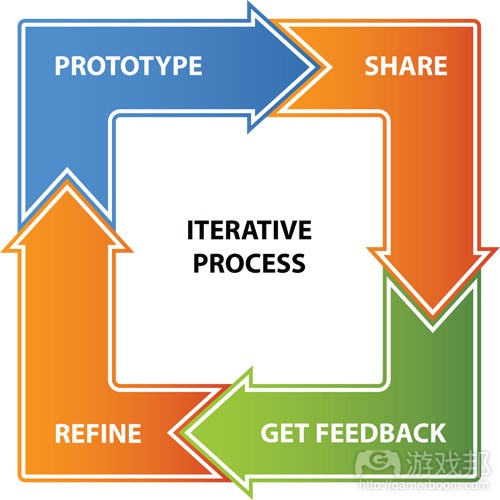分享开发团队创造迭代文化的3个要点
作者:Seth Sivak
迭代才能产生最棒的游戏,但我们该如何将其融入工作流程和文化中?这正是我们Proletariat工作室努力的方向,我们每天都在培养这种文化。以下是在你自己的团队中创造迭代文化的三个重要步骤:
1.不断评审
目标:团队中的每个人都能够以一种建设性的方式相互帮助,创造出最好的作品。
创造迭代文化的第一步是让团队成员不断评审他人的作品。虽然一开始大家会有所不适,尤其是被评审的作品尚未完工之时,但这却是在团队中建立一种反馈循环的关键。在Proletariat,我们通常是在周五进行每周评审会议,更小的团队则进行非正式的评审会议。
任务项:在开发过程中创造评审环节,让来自各个学科、领域的成员给予反馈想法。一开始可以是非正式的评审,之后可以逐步发展成自然行为。
2.不存在所谓的“完成”
目标:保持功能的弹性,以便团队成员可以在返工的时候,随着游戏发展对其润色。
持续的评审过程可以让团队自然地展示未完成的作品。下一步就是让大家清楚不存在所谓的“完成”。无论是美术、设计或代码,一切都存在改进或润色的空间。这里的尚未“完成”是指团队会在前进过程中知道自己还有机会重返原来的功能对其进行迭代。但这只适用于团队信任制作人以及进程安排的情况。
在Proletariat,我们会在备忘录中创建列表指出团队需要重新解决的问题。在每个阶段结束时,我们都会尽量留出一周时间来解决备忘录的问题,在此我们将其称为“债务周”。此时团队成员可以做自主行事,优先执行自己认为最重要的事情。
任务项:在备忘录中创建列表指出需要优化的事项。在开发过程中提供一些间歇期,以便大家有余力处理备忘录的事情。
3.放手
目标:允许开放式和诚恳的反馈,以便团队不要执拗于个人想法。
开发者难以割舍自己的某个想法,从而导致项目进程受阻的这种现象很常见。与其执拗于某个理念,还不如放手让团队其余人围绕它展开工作。
应该鼓励团队中每个人都抛出自己的想法,看看最终会产生什么结果。团队每个成员都必须清楚,当某个理念被公之于众时,它就不再属于个人想法。无论是美术、音乐、音效还是编程,各项工作均是如此。我认为最好是让大家把自己的想法传达给团队。让团队成员贡献自己的创作才华,才能更好地创造最终产品。
任务项:认真对待理念本身而非其来源。开发一种能够客观分析游戏情境中的选项的过程。
总结
创造一种迭代文化需要整个团队投入大量时间和精力。优先事项的变化当然会对开发过程带来影响,但是这种文化形成气候时,就能够推动团队每个人在积极、合作的环境中创造最好的作品。(本文为游戏邦/gamerboom.com编译,拒绝任何不保留版权的转载,如需转载请联系:游戏邦)
Creating an Iterative Culture
by Seth Sivak
The following blog post, unless otherwise noted, was written by a member of Gamasutra’s community.
The thoughts and opinions expressed are those of the writer and not Gamasutra or its parent company.
This is cross-posted from the Proletariat Blog
The best games come from iteration, but how can we build that into our process and culture? This is something we have worked hard to create at Proletariat and we push every day to foster this culture. Here are three important steps to creating a culture of iteration within your own team:
1. Constantly review
Goal: Everyone on the team helps each other create the best work possible in a constructive manner.
The first step in creating an iterative culture is for team members to constantly review their work with the rest of the team. While uncomfortable at first, especially when work is in-progress, it’s critical to establishing feedback loops within the team. At Proletariat, we formally do this on Fridays in our weekly review meetings (which we stream live on Twitch) and informally with smaller groups.
Action Item: Create review steps in the process where people from all different disciplines can give feedback on ideas. Start these formally and then allow them to develop organically.
2. Nothing is ever “done”
Goal: Stay flexible with features so that team members can return to past work and polish it while the game evolves.
The constant review process will get the team comfortable showing work that isn’t complete. The next step is to make it clear that nothing is ever “done”. There’s always room for improvement or polish, whether it is art, design, or code. As the game continues to evolve and features are completed, multiple passes may be required. The idea that it’s not done means that the team can move on knowing they’ll have a chance to return to features later and iterate on them. This only works if the team trusts the producers and the schedule.
At Proletariat, we build lists into our backlog that contain issues the team wants to re-address. At the end of every milestone, we try to leave a week to work on the backlog, which we call a “debt” week. Team members can work on their own, prioritizing the parts of their work they feel need the most attention.
Action Item: Build lists in the backlog with pieces that require polish. Provide frequent breaks during the development process to let the team dig into the backlog.
3. Give it away
Goal: Allow for open and honest feedback and ideas to encourage the team to not hold on to a single personal idea.
It is common to see developers struggle to let go of “their” idea, hurting the process. Instead of focusing on letting an idea go, put the focus on giving the idea away so the rest of the team can build from it.
Everyone on the team is expected to throw ideas into the pile and what comes out is the result of the process. Each member of the team must understand that the moment an idea is spoken aloud to the group it is no longer their idea. This is the same for any art, music, sound, or code. I like to think about this as not letting go of your ideas but instead giving them away to the team. Members are expected to contribute their creative talents and that is a great gift to the final product.
Action Item: Be critical of ideas but not their sources. Develop a process that can objectively analyze options in game context.
Conclusion
Creating a culture of iteration takes time and focus from the entire team. Priorities need to be shifted and changes to the process can certainly take a toll on development. However, once this culture is established, it can enable the team to push each other to create their best work in a positive, collaborative environment.(source:gamasutra)
下一篇:敏捷开发的困境:3个危险信号








































 闽公网安备35020302001549号
闽公网安备35020302001549号